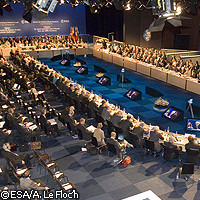Nov 30 2008
Europe's space ministers are backing a range of new and existing initiatives that give Europe the opportunity to enhance its role in space and use space applications to respond more effectively to global challenges such as climate change and security issues. The ministers met at the Council Meeting at Ministerial Level of the European Space Agency (ESA), which took place in The Hague, the Netherlands, on 25 and 26 November. During the meeting, the ministers, from ESA's 18 Member States plus Canada, adopted four resolutions.

Among other topics, these covered the role of space in delivering Europe's global objectives and established the level resources for ESA's space science programmes and basic activities for the period from 2009 to 2013. The ministers also approved the continuation of a number of ongoing optional programmes and the initiation of new programmes. 'Through this meeting, the ESA Ministers have seized the opportunity to capitalise on the recent successes and achievements of Europe in space and to translate the political impetus into new programmes able to deliver knowledge, services and competitiveness,' reads an ESA statement on the outcomes of the meeting.
The ministers gave the green light to a wide range of scientific initiatives. These include the organisation's subscriptions for the human spaceflight, microgravity and human exploration programmes, including the use of the International Space Station (ISS). Period 3 of the 'European programme for life and physical sciences' (ELIPS) foresees extensive use of the Columbus laboratory on the ISS to seek answers in space to fundamental questions in life and physical sciences. There is a strong focus on applied research, covering areas such as the development of diagnostics and treatments for age-related diseases, as well as industry-driven research and development projects in aerospace, energy and biotechnology. The ministers also renewed their subscription for the 'Advanced research in telecommunications systems' (ARTES) programme.
This focuses on the development and demonstration of technologies for a European Data Relay System, an air traffic management system and an integrated system combining telecommunications, Earth observation and navigation satellite systems with terrestrial information and communications systems. Finally, the ministers approved ESA's subscriptions for the programme behind the European Global Navigation Satellite System, which is set to work on improvements to the Galileo system. The new budget for the ESA reflects a substantial increase over previous years. Member States reportedly agreed on a EUR 10 thousand million figure to cover the next three to five years.